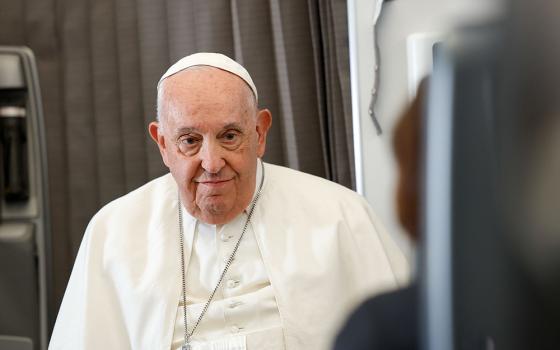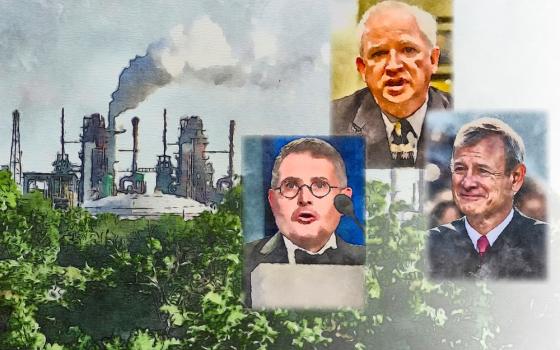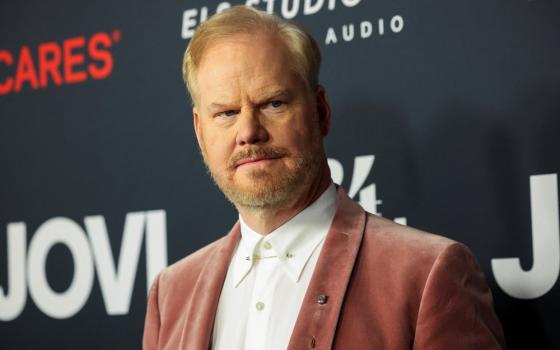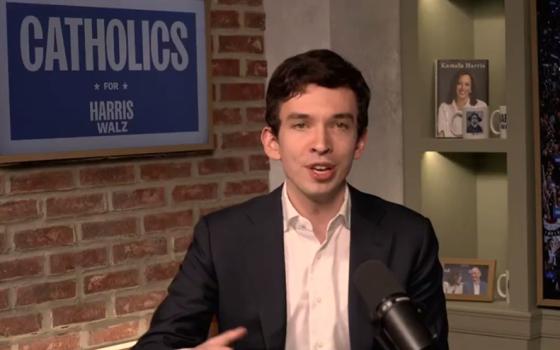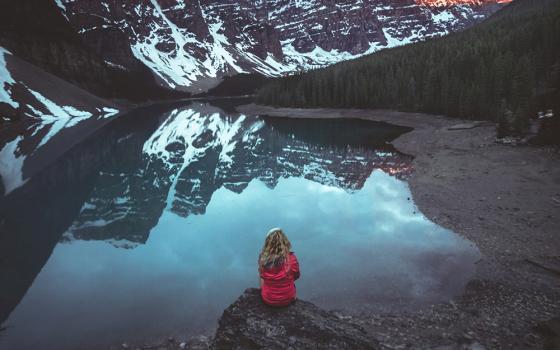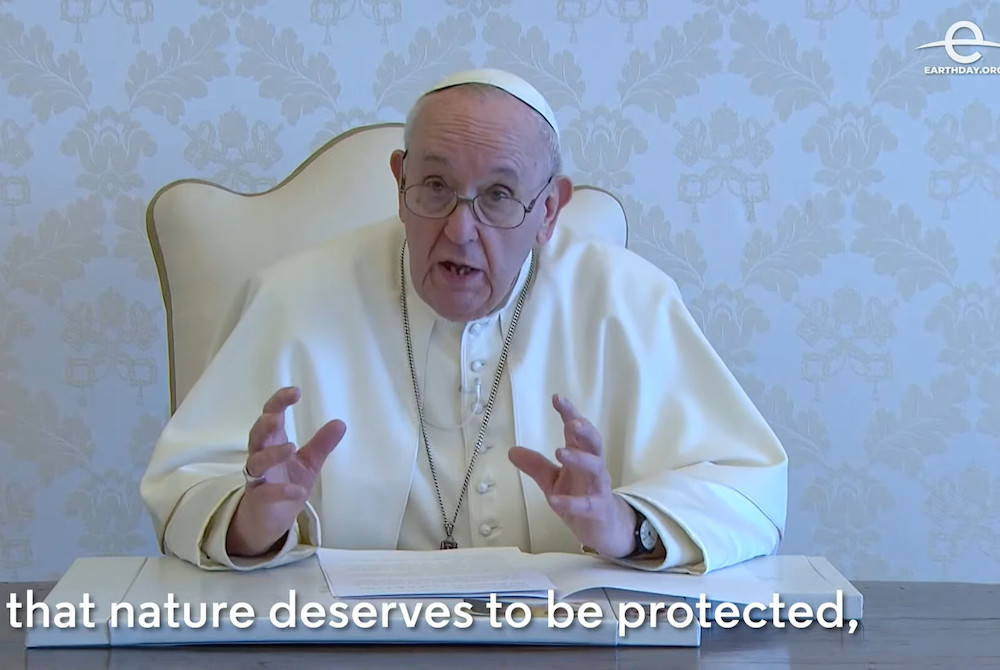
Pope Francis delivers a pre-recorded message for Earth Day Live, organized April 22, 2021 by the Earth Day Network. (EarthBeat screenshot)
Editor's note: This story was updated April 22 at 3:30 p.m. CDT with additional reporting. It was updated again April 23 at 9:30 a.m. CDT with details on other Earth Day celebrations.
In twin Earth Day messages, Pope Francis warned a gathering of world leaders and the global community at large that "we are at the edge" with climate change, and the time to take action is now.
The pope made appearances minutes apart April 22 during two virtual events marking Earth Day: the international leaders summit on climate organized by U.S. President Joe Biden, and the Earth Day Live livestream organized by the Earth Day Network. In both, Francis urged presidents and prime ministers to act courageously in addressing climate change, and to learn from the coronavirus pandemic the need to create "a just, equitable, environmentally safe planet."
"Both the global catastrophes, Covid and climate change, prove that we do not have time to wait," Francis said in a pre-recorded video for Earth Day Live. "Time urges us, and as COVID-19 demonstrated, we do have the tools to face the loss. We have the instruments. This is the moment to act. We are at the edge."
"We need to ensure that the environment is cleaner, purer and that it is conserved. We must care for nature so that nature may care for us," Francis said later to the summit.
The pope was one of more than three dozen heads of state — from countries that together represent more than 80% of total global greenhouse gas emissions — who took part in the virtual climate summit convened by Biden.
Francis called the gathering "a happy occasion" and said it was an initiative that puts all of humanity on a path toward better stewardship of nature and accomplishing goals of the Paris Agreement at the next United Nations climate conference, COP 26, scheduled for Glasgow, Scotland, in November.
"It is a challenge we face in this post-pandemic time. It has not yet ended, but we will, we must, look ahead, because it is a crisis," Francis told the world leaders. "We know that one does not emerge from a crisis the same: We emerge either better or worse."
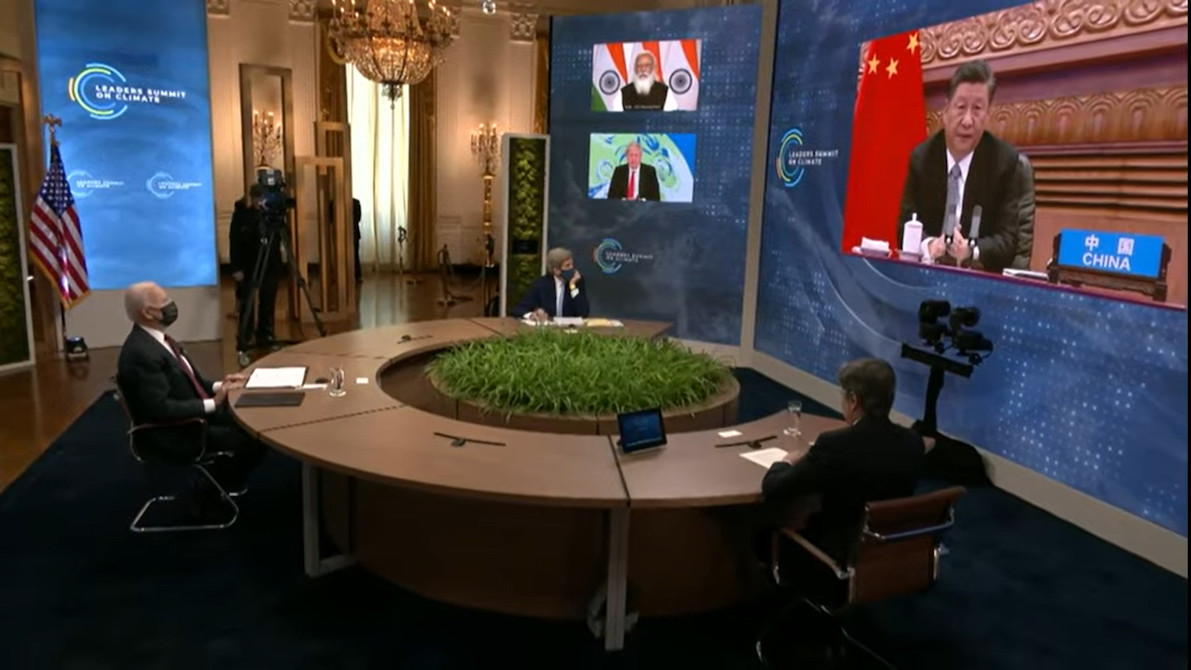
U.S. President Joe Biden, left, talks to China President Xi Jinping on screen, right, during the first day of the U.S. State Department's Leaders Summit on Climate April 22, 2021. (EarthBeat screenshot)
The two-day Biden climate summit was intended to signal the U.S. return to a leadership position in international climate change diplomacy. To that end, Biden announced a new U.S. target under the Paris Agreement, committing the country — the largest historic emitter — to cutting its greenhouse gas emissions by 50% to 52% from 2005 levels by 2030.
The pledge nearly doubles the first U.S. climate target under the Paris accord, made in 2015, and puts the U.S. on a par with the European Union and United Kingdom for the most stringent targets. Nevertheless, scientists and climate activists say they are still not enough to meet the higher Paris goal of limiting average global temperature rise to 1.5 degrees Celsius, a shortcoming that several leaders, including U.S. climate envoy John Kerry, acknowledged during the summit.
Many of the leaders at the summit welcomed the new U.S. target and the nation's return to the Paris Agreement — one of Biden's first moves in the Oval Office after former President Donald Trump briefly pulled the country out of the deal as part of a de-emphasis of climate and environmental issues during his administration.
In his opening remarks, Biden said that the cost of not acting on climate change "is mounting."
"No nation can solve this crisis on our own," the president added. He called on countries, especially the largest economies, to step up their ambition, including providing greater financing to help vulnerable countries mitigate the impacts of climate change and adapt to a warming world.
Along with the new U.S. target, Biden announced the U.S. would double its climate financing to developing countries by 2024.
"This is a moral imperative, an economic imperative," Biden said. "A moment of peril, but also a moment of extraordinary possibilities. Time is short, but I believe we can do this. And I believe we will do this."
"We need to ensure that the environment is cleaner, purer and that it is conserved. We must care for nature so that nature may care for us.'
—Pope Francis on Earth Day
Ursula von der Leyen, president of the European Union, added that "this will be the make-or-break decade for our climate."
Other nations, including Japan and Canada, also announced ramped-up climate goals, referred to as Nationally Determined Contributions, while others like South Korea, South Africa and Bangladesh said they intended to submit new targets in the coming months.
China, currently the largest producer of greenhouse gas emissions, restated its goal of peaking emissions by 2030 and achieving carbon neutrality by 2060. President Xi Jinping said the globe's largest coal consumer would "strictly limit" its coal use in the next five years before phasing it down.
And Brazil's President Jair Bolsonaro, who once threatened to pull out of the Paris accord, said he would move up the country's net-zero target by a decade, to 2050, and end illegal deforestation by 2030. Earlier this month, Catholic organizations pressured the Brazilian government to stop deforestation in the Amazon, which has risen sharply in the past two years, and to protect Indigenous and traditional communities in that region.
As world leaders listed steps their countries were taking, youth climate activists at the summit and around Washington, D.C., raised some of the loudest voices pressing that far more be done.
Xiye Bastida, an 18-year-old activist from Mexico and part of the Fridays for Future movement, delivered a strong and direct message at the summit, telling the assembled leaders, "You need to accept that the era of fossil fuels is over," before laying out a list of youth demands that included carbon neutrality by 2030; an end to fossil fuel investments, subsidies and infrastructure; and that the transition to a renewables-powered economy include frontline and vulnerable communities and avoid the "sacrifice zones" of past fossil fuel development.
"You will often tell us again and again that we are being unrealistic and unreasonable, but who is being unrealistic and unreasonable with unambitious, non-bold, so-called solutions? You are the ones creating and finding loopholes in own legislations, resolutions, policies and agreements," she said.
On Capitol Hill, Greta Thunberg appeared virtually before the House Oversight Committee and called it "a disgrace" that taxpayer money continues to be used to subsidize fossil fuels, saying "it is a clear proof that we have not understood the climate emergency at all."
"How long do you think you can continue ignoring the climate crisis, the global aspect of equity and historic emissions, without being held accountable? Sooner or later, people are going to realize what you have been doing all this time," Thunberg said, adding, "You still have time to do the right thing and save your legacies, but that window of time is not going to last for long."
In a statement, Jose Aguto, associate director of the Catholic Climate Covenant, said the summit, along with Biden's American Jobs Plan, were "positive steps our nation can take to uplift the dignity of all people and address climate change." An interfaith statement from 13 religious organizations, including Interfaith Power & Light and the Maryknoll Office for Global Concerns, offered "prayers and our hopes for moral leadership" during the summit" and that the U.S. respond to climate change "with urgency, fairness and equity."
"Addressing the scale of this problem in all its dimensions requires us, and indeed all stakeholders, to embrace a whole community approach, with government taking on a significant role," the faith organizations wrote.
Officials with the Maryknoll Offfice in their own statement applauded the summit, calling it "a good step forward in the right direction." Chloe Noël, its faith, economy and ecology program coordinator, said the U.S. commitments "make a just and equitable recovery possible," adding that climate projects worldwide have to include local community participation and respect human rights and environmental integrity.
Eric LeCompte, executive director of the Jubilee USA Network, was encouraged that the summit included a diverse representation across geography, industry and varying economies. He added it was an important signal that Treasury Secretary Janet Yellen spoke and that debt relief for developing countries be considered in conjunction with sustainable investments in those regions.
Advertisement
The White House summit follows a similar virtual summit hosted by the United Nations in December to mark the five-year anniversary of the Paris Agreement. At that gathering, Francis committed the Vatican to becoming carbon neutral by 2050.
Efforts are also under way to ramp up action within the global Catholic Church. Next month, the Vatican's Dicastery for Promoting Integral Human Development is expected to launch its Laudato Si' Action Platform, which aims to catalyze Catholic parishes, dioceses, schools, hospitals and religious orders to put into action the messages of Francis' 2015 encyclical "Laudato Si', on Care for Our Common Home."
Bill O'Keefe, head of advocacy with Catholic Relief Services, told EarthBeat he hoped the White House summit would re-energize world leaders around climate change, and especially "robust funding" for the Green Climate Fund and other foreign assistance to help countries suffering the effects of climate change with adaptation measures. He said Francis' presence at the summit keeps people on the periphery in the forefront in discussions about climate policy.
"We hope that he will be able to highlight the reality that Catholic Relief Services sees every day, which in summary is that those who did the least cause this problem — the vulnerable farmers in South Sudan, the urban residents in coastal areas in the Philippines — they're the ones who are being most impacted and their needs need to be front and center."
In introducing Francis at the summit, Kerry said, "Few have used their voice in more profound fashion to shape the global climate movement than His Holiness, Pope Francis," adding that "he not only helped make the Paris Agreement possible, but has continued to bring his humble message of justice and solidarity to so many of the world leaders gathered here today."
During his Earth Day Live message, Francis said, "We are becoming more and more aware that nature deserves to be protected … with the utmost care and respect" for the planet's biodiversity. Once the destruction of nature is triggered, he added, it becomes difficult to stop.
"But we still have time," he added, urging people and countries to work together toward innovations and new pathways to make the world a better place than before the pandemic.
"This is the challenge," Francis said. "And if we do not emerge better, we will start on a path of self-destruction."
Across the country, Catholics joined in the Earth Day celebration.
Holy Family School in Philadelphia held its first schoolwide neighborhood cleanup. The Catholic Climate Covenant encouraged parishes and other groups to hold screenings of the 2019 documentary "The Condor & The Eagle," which chronicles Indigenous leaders in North America and South America as they connect in their shared fights to preserve critical ecosystems against extractive industries.
A coalition of five Catholic organizations on April 23 kicked off a 21-day environmental justice challenge to spotlight the connections between racism and ecological issues. Partners of Interfaith Power & Light, which this year marked its 20th anniversary, continued their annual Faith Climate Action Week, focused this year on the theme of "sacred ground" and the connections between food, faith and climate.
Numerous Catholic universities held events on campus. Villanova University hosted climate scientist Katharine Hayhoe, who debunked four myths about environmentalism. King's College, in Wilkes-Barre, Pennsylvania, hosted a discussion on environmental ethics. Seattle University held its second series of Earth Talks.
At Gonzaga University, the Jesuit school launched its new Center for Climate, Society and the Environment. The interdisciplinary center aims to provide students and faculty, along with the Spokane region in eastern Washington, with resources, research and skills to face the challenges brought by climate change.
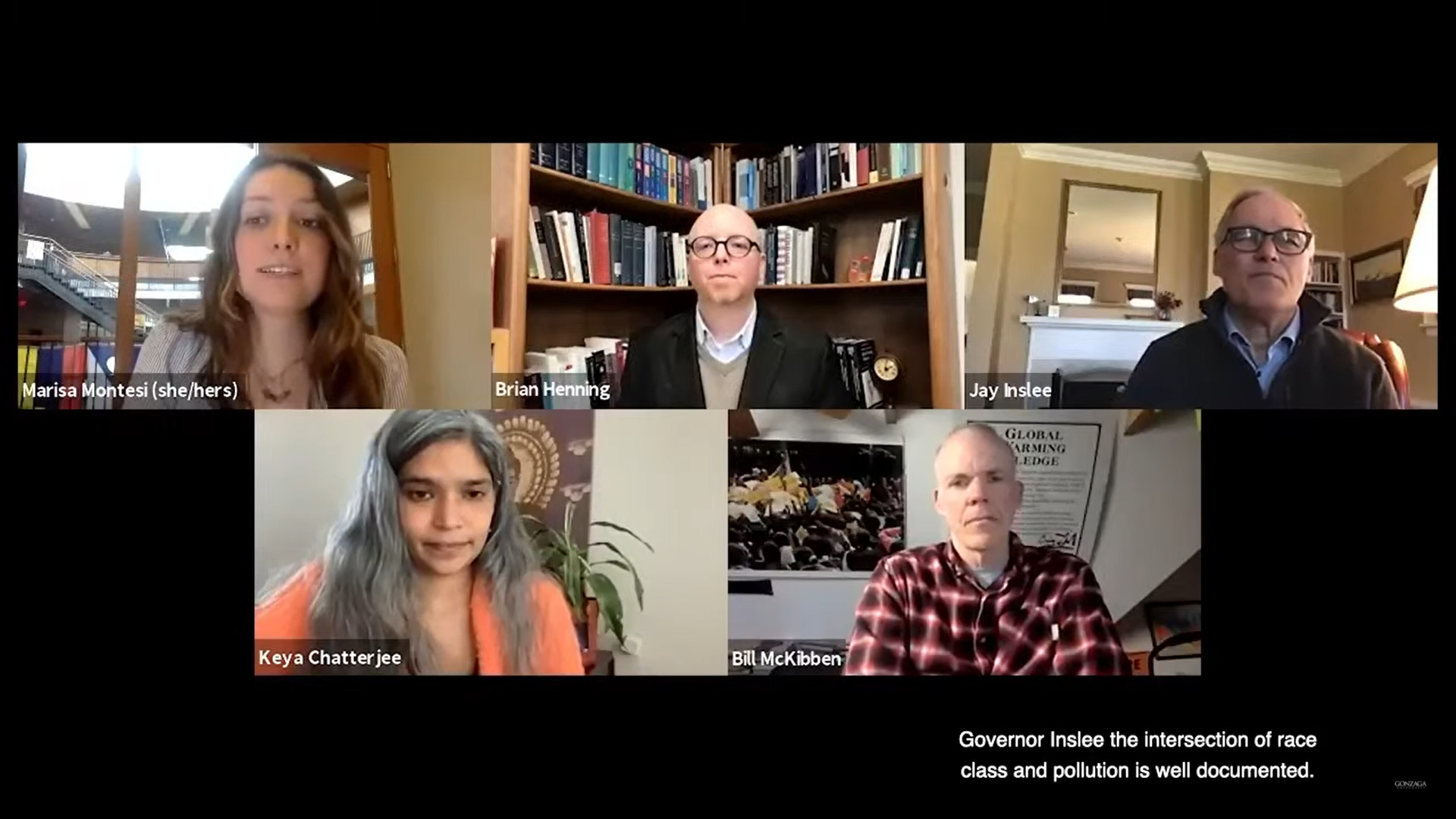
On Earth Day, April 22, Gonzaga University debuted its new Center for Climate, Society and the Environment. A launch event featured a panel that included, from top left, senior Marisa Montesi, center director Brian Henning, Washington Gov. Jay Inslee, Keya Chatterjee, executive director of the U.S. Climate Action Network, and environmental activist Bill McKibben. (EarthBeat screenshot)
The launch event featured accolades from prominent leaders within the church and Washington state, including both its U.S. senators; Jesuit Fr. Arturo Sosa, superior general of the Society of Jesus; and Salesian Fr. Joshtrom Kureethadam, head of the ecology and creation sector of the Vatican's integral human development dicastery. Gov. Jay Inslee joined a panel discussion alongside environmental activists Bill McKibben of 350.org and Keya Chatterjee, the executive director of the U.S. Climate Action Network.
Chatterjee said she hoped the center would inspire a new generation of students to lead in pushing for action on climate. When asked her advice to young people who feel overwhelmed by the magnitude of the issue, she encouraged them to get involved, so as to "feel like you have some agency over the situation."
Inslee, a top politician on addressing climate change, said he was "thrilled" to see Gonzaga take on a leadership role on climate. He, too, encouraged students to lead in their professional careers, whether they enter the environmental sector, business or something else. More than anything, the governor urged them not to let up on insisting to those in power that more be done.
"We need the impatience of youth. It demands it. We do not have much time in this effort," Inslee said.

